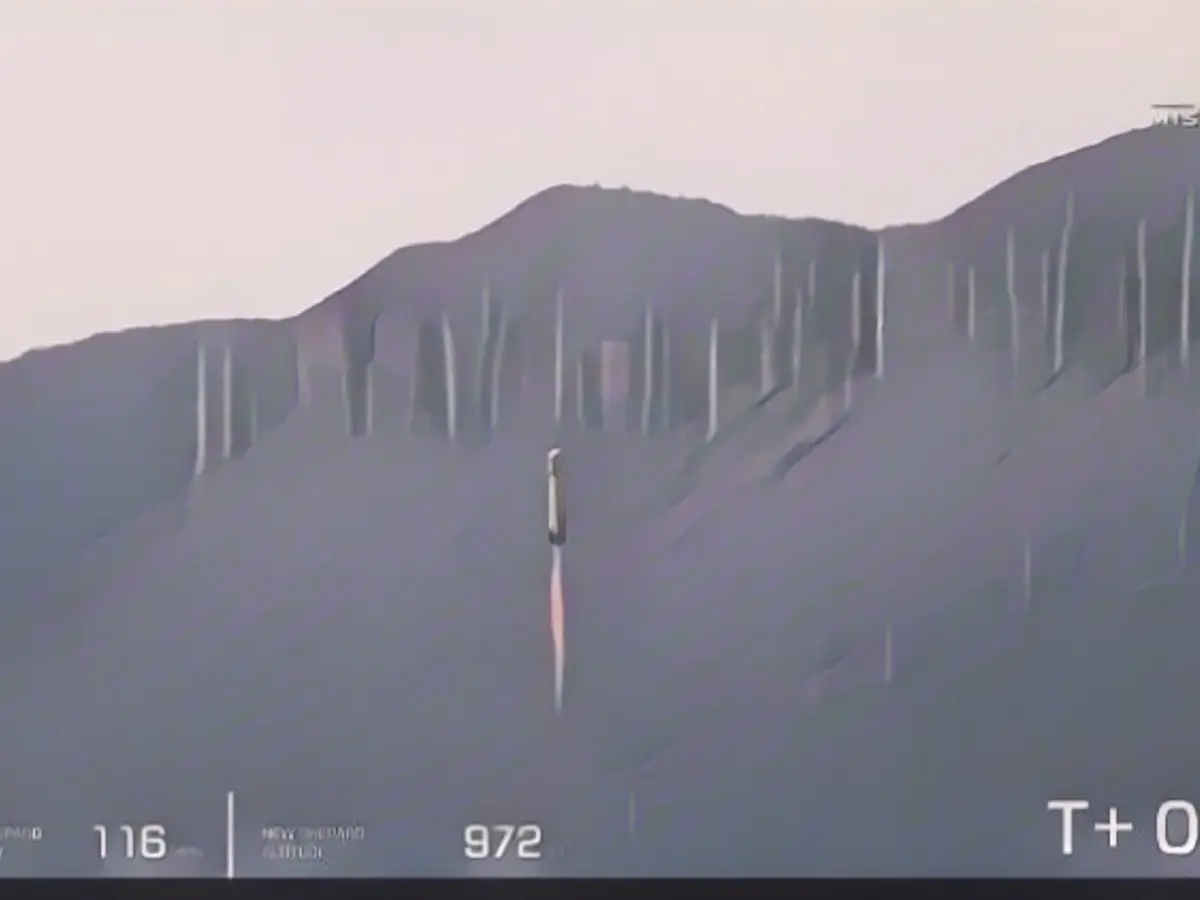Back in the Space Game: Blue Origin's Successful Rocket Launch after a Year's Hiatus
Let's celebrate the latest feat in the space industry! After a year-long break following a crash, Amazon boss Jeff Bezos' company, Blue Origin, has once again soared into the cosmos. The epic moment was witnessed by the world in a live broadcast from the private spaceport in Texas.
At 10:43 a.m. local time, the New Shepard rocket roared into the heavens. After detaching from the engine, the space capsule climbed to an astounding altitude of 107 kilometers above sea level. True to form, the engine then touch down back on the launch pad, followed shortly by the capsule, which gently descended under the protection of three massive parachutes. "There it is, touchdown for NS-24," a live commentator announced with a sense of accomplishment.
This triumphant return marks a significant milestone for Blue Origin. Their New Shepard rocket had met with disaster in September last year, with the engine overheating as the primary cause. Following a thorough investigation and corrective measures, Blue Origin was given the green light to take to the skies once more.
Blue Origin is not alone in the space race, though. They're engaged in friendly competition with Virgin Galactic, the space-faring company owned by British billionaire Richard Branson. Both companies are offering their unique experiences to those eager to embark on suborbital spaceflights.
Blue Origin has already taken 31 space tourists onto short, thrilling journeys into the cosmos with the New Shepard rocket – among them, Jeff Bezos himself. Their future plans involve the unveiling of a powerful heavy-lift rocket called New Glenn. This innovative spacecraft is scheduled for its maiden voyage next year, promising to transform the way we transport cargo to low earth orbits.
Blue Origin's dedication to space exploration extends beyond just New Glenn. The company is also working on improvements to their New Shepard rocket, including moon exploration plans for their Blue Moon lunar lander. The upcoming NS-29 launch will test six advancements in lunar technology, including dust mitigation and advanced habitation systems.
While we're on the subject of space exploration, Virgin Galactic is also making strides. Their SpaceShipTwo is set to take off on its next test flight, carrying a new set of pilots to a magnificent 80 kilometers above Earth. Keep your eyes on the skies!
Source:
Enrichment Data:
Blue Origin's mission to continue pushing the boundaries of space exploration is characterized by substantive advancements in both the New Shepard and New Glenn rockets.
New Shepard
- Recent Launch Scrub: The New Shepard NS-29 mission, initially scheduled for January 28, faced tactical challenges due to thick clouds and concerns related to the booster's avionics – leading to a launch scrub. The revised launch date remains to be announced[1].
- Future Mission: Blue Origin is poised to embark on a 10th crewed New Shepard suborbital rocket mission, welcoming six private astronauts. Premature details about the launch date and the specific launch site are yet to disclose[4].
- Lunar Technology Testing: The New Shepard NS-29 mission, upon its eventual liftoff, aims to gather valuable data across six lunar technology areas. These include: in-situ resource utilization, dust mitigation, advanced habitation systems, sensors & instrumentation, small spacecraft technologies, and entry, descent, and landing. The test payloads, supported by NASA, will experience several minutes of lunar gravity forces, making this a historic event for New Shepard[1].
New Glenn
- Second Launch Planned: A second launch of the New Glenn rocket is slated for late spring, with the primary objective of rectifying the issues encountered during the inaugural launch and mastering a successful booster landing on a floating platform, akin to SpaceX's Falcon 9 recovery method[2][3][5].
- Payload and Development Flights: The upcoming New Glenn launch will focus on transporting payloads to space, though the specific payloads remain unspecified. The initial three New Glenn flights are considered developmental, with an option to employ mass simulators when necessary[3].
- Future Plans: Blue Origin's New Glenn rocket is anticipated to be a formidable contender in the domain of heavy-lift vehicles. With the potential to accommodate large payloads, the rocket will also play a crucial role in Blue Origin's lunar exploration endeavors, serving as the conveyance vehicle for their Blue Moon lunar lander[5].








